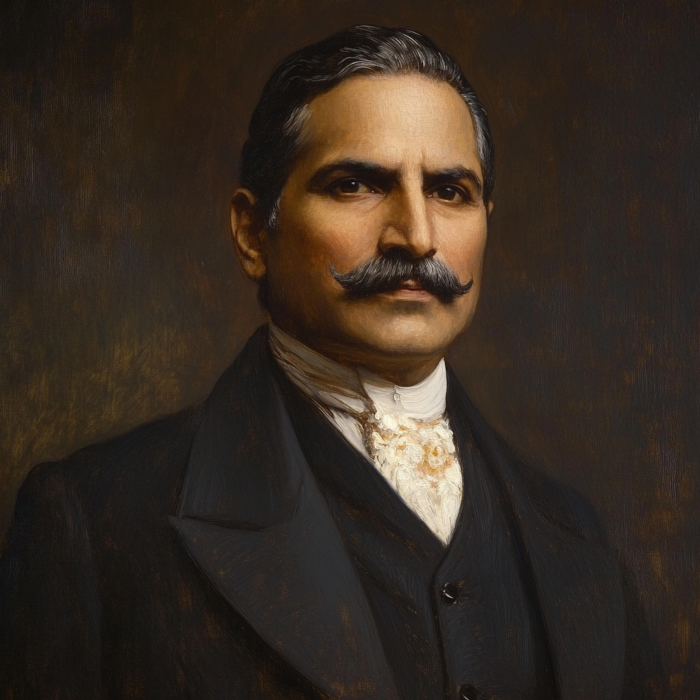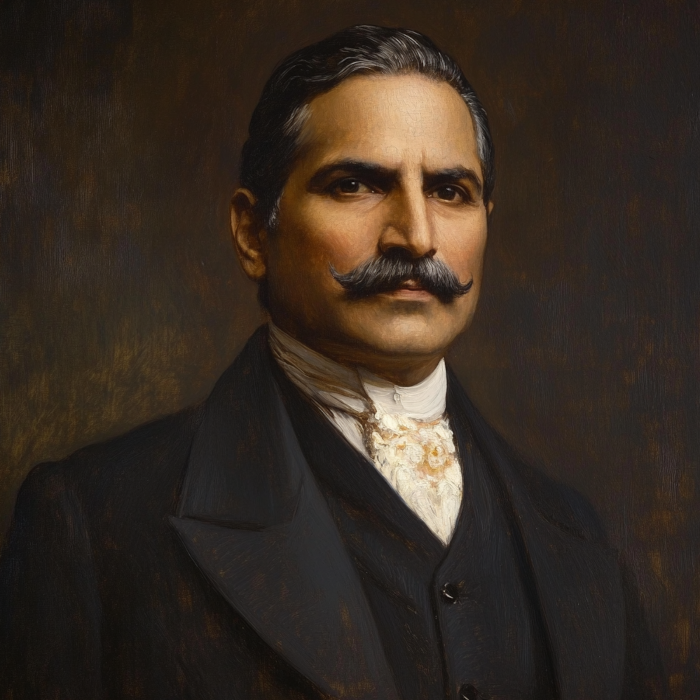


Sir Muhammad Iqbal (1877–1938), also known as Allama Iqbal, was a renowned philosopher, poet, and politician in British India who is widely regarded as the "Spiritual Father of Pakistan". He was one of the most important figures in Urdu and Persian literature, and his poetry is celebrated for its emphasis on self-realization, spiritual awakening, and the revival of the Muslim identity. Iqbal was also a significant political thinker and played a crucial role in inspiring the movement that led to the creation of Pakistan. His vision for an independent Muslim state in northwest India ultimately paved the way for the formation of Pakistan in 1947.
Birth and Background: Muhammad Iqbal was born on November 9, 1877, in Sialkot, in the Punjab region of British India (now in Pakistan). He was born into a devout Kashmiri Muslim family. His father, Sheikh Noor Muhammad, was a tailor, and his mother, Imam Bibi, was a religious and kind-hearted woman. Iqbal’s family background and the religious environment of his upbringing played a significant role in shaping his personality and philosophical outlook.
Education in India: Iqbal attended Scotch Mission College in Sialkot, where he studied Arabic, Persian, and Islamic theology. He later went on to study at Government College in Lahore, where he earned a Bachelor of Arts degree and later completed his Master's in Philosophy. At Government College, Iqbal was greatly influenced by his mentor, Sir Thomas Arnold, who encouraged him to pursue further studies in philosophy and literature.
Studies in Europe: In 1905, Iqbal traveled to Europe for higher education. He studied at Trinity College, Cambridge, where he obtained a degree in philosophy, and later attended the University of Munich, earning a Ph.D. in philosophy. His doctoral thesis, titled "The Development of Metaphysics in Persia", focused on Islamic philosophy and demonstrated his deep interest in spiritual and intellectual inquiry. Iqbal also studied law at Lincoln's Inn in London, and upon returning to India, he practiced law while continuing his writing and political activities.
Poetry as a Tool for Awakening: Muhammad Iqbal is best known for his contributions to Urdu and Persian poetry. His poems were not only literary masterpieces but also vehicles for social and spiritual awakening. Through his poetry, Iqbal sought to inspire the Muslim community of British India to strive for self-realization, empowerment, and unity. His poetry emphasized the need for self-awareness and action, urging people to break free from stagnation and become the architects of their destiny.
Themes in Iqbal's Poetry: Iqbal's poetry covered a wide range of themes, including spiritual awakening, self-development (khudi), and the idea of a united Muslim Ummah. He often drew upon Islamic traditions and the teachings of the Quran, combining them with modern philosophical concepts. His notion of khudi (selfhood) encouraged individuals to cultivate their inner potential, achieve self-awareness, and contribute to the greater good. Iqbal's poetry also reflected his admiration for the greatness of past Muslim civilizations and his belief in the revival of the Muslim world through intellectual and spiritual rejuvenation.
Persian and Urdu Works: Iqbal wrote extensively in both Persian and Urdu. Some of his most famous works include:
The Concept of Khudi: One of Iqbal's central philosophical concepts was khudi, which he described as an individual's capacity for self-realization and creative expression. In his view, the development of one's khudi was essential for personal growth and the advancement of society. Iqbal believed that by realizing their inner potential, individuals could overcome limitations and rise to greatness. He urged people to embrace their creative powers, take responsibility for their actions, and strive for a higher purpose.
Influence of Western and Islamic Philosophy: Iqbal's thought was influenced by both Western and Islamic philosophy. He was inspired by Western philosophers such as Friedrich Nietzsche, Henri Bergson, and Johann Wolfgang von Goethe, as well as Islamic thinkers like Rumi and Al-Ghazali. However, Iqbal was critical of Western materialism and secularism, which he saw as devoid of spiritual values. He sought to combine the best elements of both worlds, promoting a synthesis of modernity and spirituality that would empower the Muslim community to thrive in a rapidly changing world.
Entry into Politics: In addition to his literary and philosophical pursuits, Muhammad Iqbal became actively involved in politics. He was deeply concerned about the social and political conditions of the Muslims of British India and believed that political mobilization was necessary to protect their rights and interests. In 1926, he was elected to the Punjab Legislative Council, where he represented the Muslim community and worked to address their concerns.
Presidential Address at the Allahabad Session (1930): One of the most significant contributions of Iqbal to South Asian politics came in 1930, when he delivered his famous presidential address at the annual session of the All India Muslim League in Allahabad. In this speech, Iqbal articulated his vision for the future of Muslims in India. He proposed the idea of an independent Muslim state in the northwestern regions of India, where Muslims were in the majority. This proposal laid the foundation for the creation of Pakistan in 1947. Although Iqbal did not specifically call for the partition of India at that time, his vision for a separate homeland for Muslims became a rallying point for the Pakistan movement.
Correspondence with Muhammad Ali Jinnah: Iqbal's ideas had a profound influence on Muhammad Ali Jinnah, who would later become the founder of Pakistan. In the early 1930s, Iqbal began corresponding with Jinnah, urging him to take up the leadership of the Muslim community and work towards a separate political identity for Muslims. He emphasized the need for a political organization that could protect Muslim interests in a predominantly Hindu India. Iqbal's encouragement played a crucial role in Jinnah's decision to re-enter Indian politics and lead the All India Muslim League.
Advocate for Muslim Unity and Revival: Iqbal believed that the Muslims of India needed to unite under a common identity to protect their religious, cultural, and political rights. He was an advocate for the revival of Islamic thought and emphasized the need for ijtihad (independent reasoning) to adapt Islamic teachings to the challenges of the modern world. He viewed Islam not only as a religion but as a comprehensive way of life that offered guidance for both the individual and society.
Spiritual Father of Pakistan: Muhammad Iqbal is often regarded as the "Spiritual Father of Pakistan" for his role in articulating the idea of a separate homeland for Muslims in South Asia. His vision of an independent Muslim state, which he expressed in his Allahabad address, inspired the Pakistan movement and laid the intellectual groundwork for the creation of Pakistan. Although Iqbal did not live to see the establishment of Pakistan, his contributions to its foundation are widely recognized.
National Poet of Pakistan: Iqbal is celebrated as the National Poet of Pakistan, and his poetry remains an important part of the cultural and literary heritage of the country. His works are taught in schools and universities across Pakistan, and his message of self-awareness, spiritual awakening, and empowerment continues to inspire generations of Pakistanis. Iqbal Day is observed annually on November 9 to honor his legacy.
Philosopher of the East: Iqbal's philosophical thought has earned him the title of "Mufakkir-e-Pakistan" (The Thinker of Pakistan) and "Hakeem-ul-Ummat" (The Sage of the Nation). His emphasis on the importance of self-awareness and spiritual development has made him a revered figure not only in Pakistan but also across the wider Muslim world. He is remembered for his efforts to revive the intellectual and spiritual vitality of the Muslim community and for his belief in the transformative power of individual potential.
Influence Beyond South Asia: Iqbal's influence extended beyond South Asia, and he is regarded as one of the most important Muslim thinkers of the 20th century. His ideas on Islamic revival and modernity were well-received by intellectuals and reformers in other parts of the Muslim world. His poetry in Persian was particularly influential in Iran and other Persian-speaking regions, where it resonated with those seeking a balance between modernity and spiritual values.
Iqbal's Concept of the "Reconstruction of Religious Thought": In his series of lectures titled "The Reconstruction of Religious Thought in Islam" (published in 1930), Iqbal addressed the need to rethink and reinterpret Islamic teachings in light of contemporary challenges. He argued for the importance of ijtihad (independent reasoning) and the adaptation of religious practices to changing circumstances. These lectures have been influential in shaping modern Islamic thought and continue to be studied by scholars interested in the compatibility of Islam with modernity.
Muhammad Iqbal passed away on April 21, 1938, in Lahore, Punjab. His death came nine years before the creation of Pakistan, but his vision for an independent Muslim state was realized with the formation of Pakistan in 1947. He is buried in Hazuri Bagh, near the Badshahi Mosque in Lahore, and his tomb has become a symbol of his enduring legacy.
Sir Muhammad Iqbal was a visionary poet, philosopher, and political thinker who played an instrumental role in inspiring the movement that led to the creation of Pakistan. His poetry, written in Urdu and Persian, emphasized themes of self-realization, spiritual awakening, and empowerment, and sought to inspire Muslims to take control of their destiny. As a political leader, Iqbal's advocacy for an independent Muslim state laid the intellectual groundwork for the Pakistan movement, earning him the title of the "Spiritual Father of Pakistan".
Iqbal's influence on Urdu literature, Islamic thought, and South Asian politics is immense. His works continue to inspire people across Pakistan and the broader Muslim world, and his ideas on individual potential, spiritual revival, and the need for a modern understanding of Islam have made him one of the most respected figures in modern Islamic history. His legacy as a philosopher, poet, and political visionary continues to resonate today, making him a central figure in the cultural and intellectual heritage of South Asia.

We use cookies
We use cookies and other tracking technologies to improve your browsing experience on our website, to show you personalized content and targeted ads, to analyze our website traffic, and to understand where our visitors are coming from. Privacy Policy.